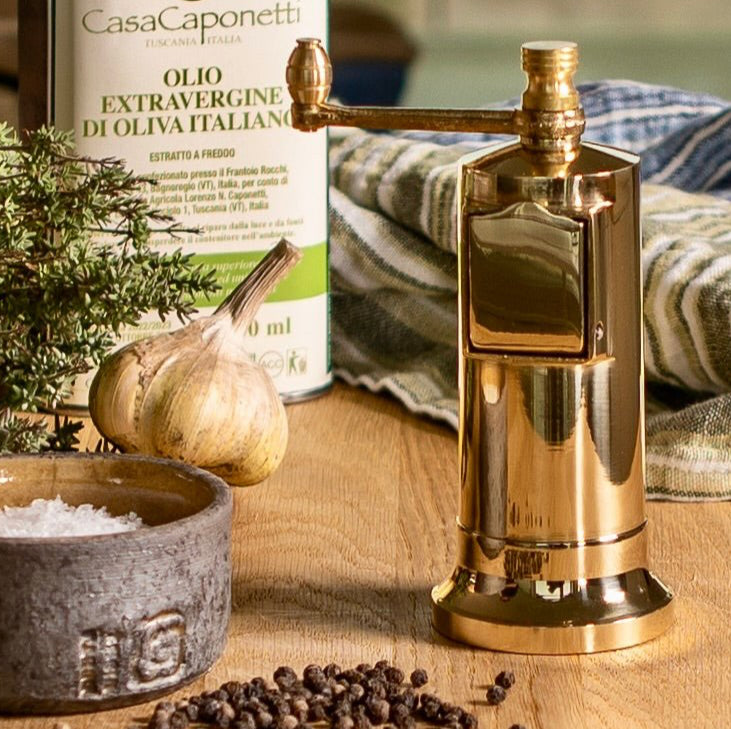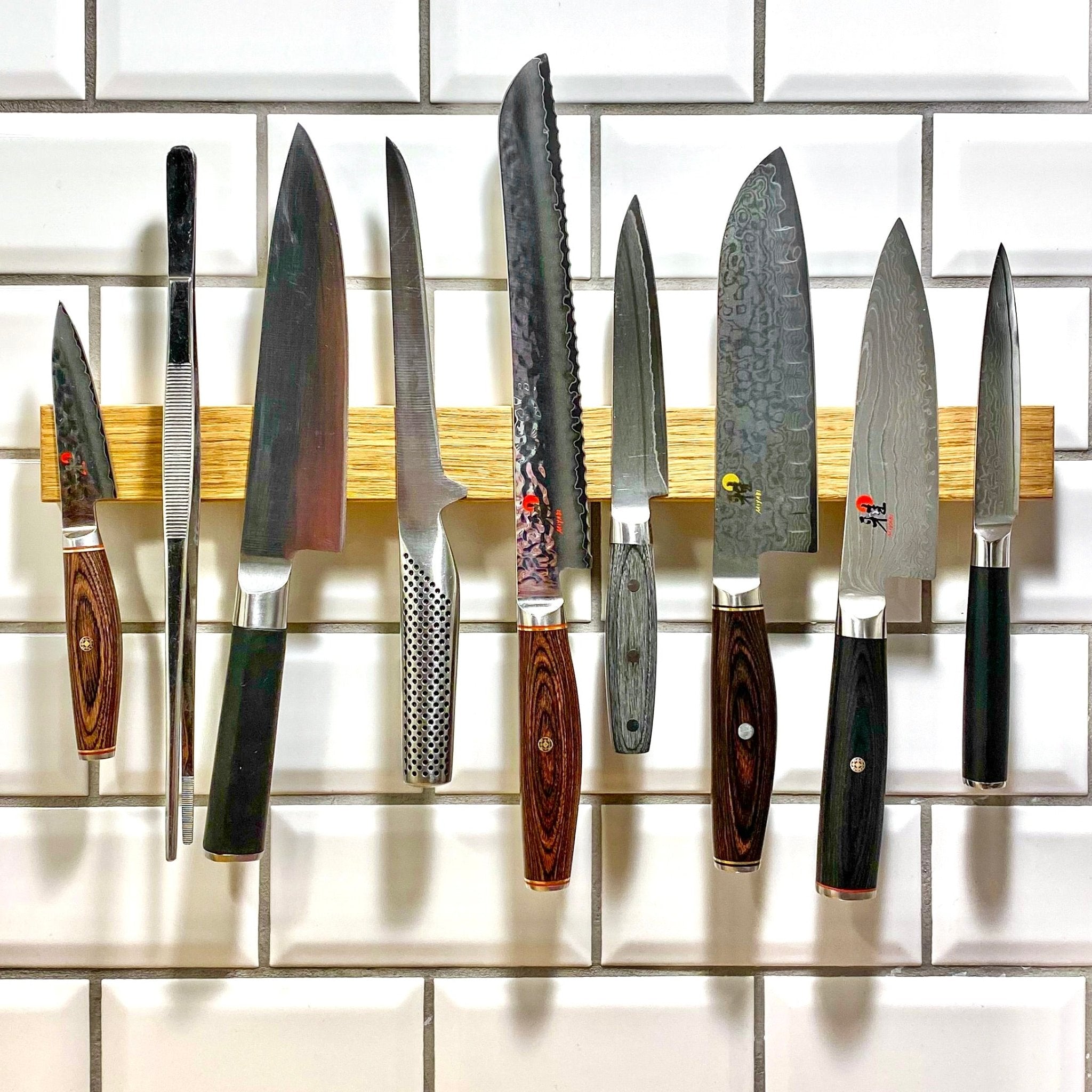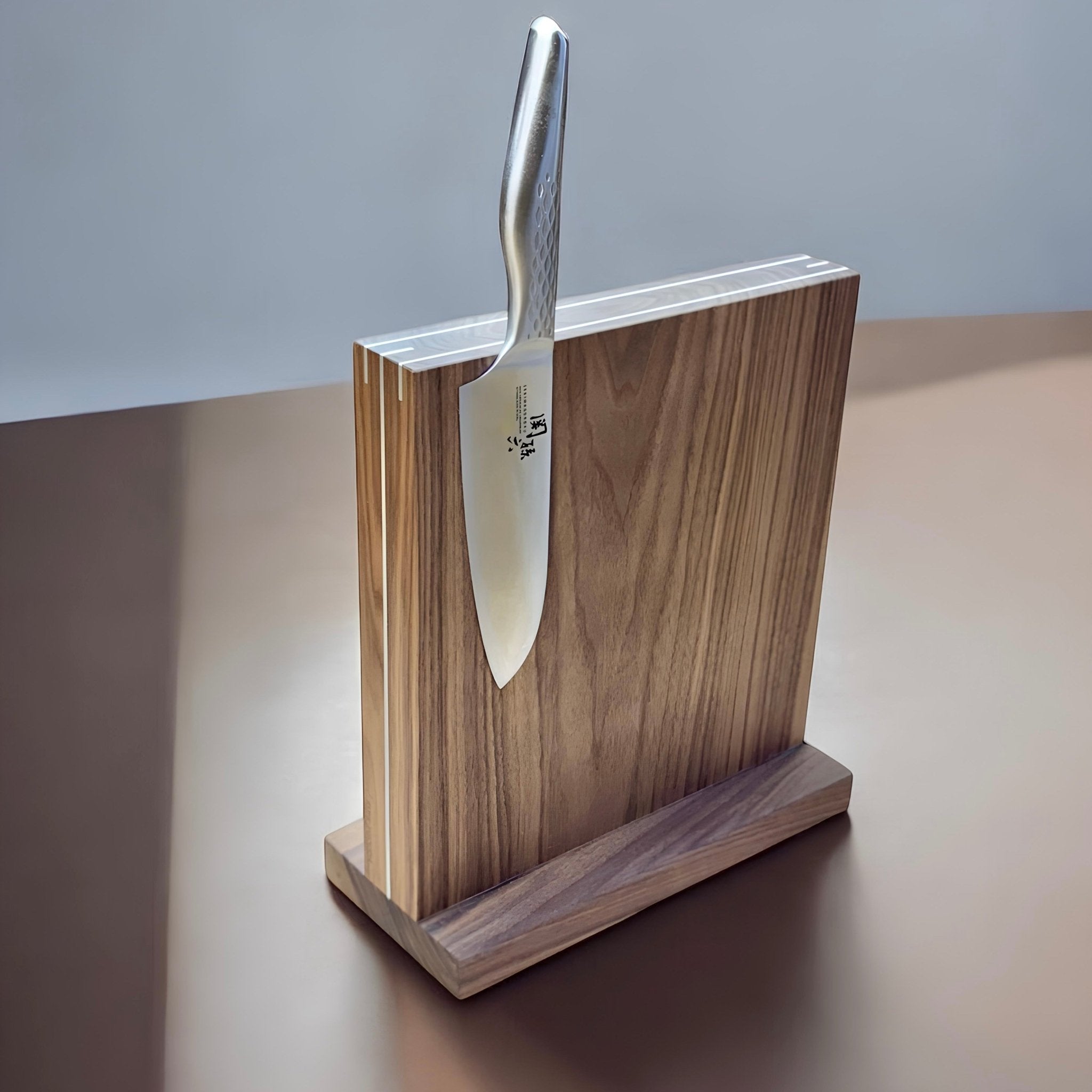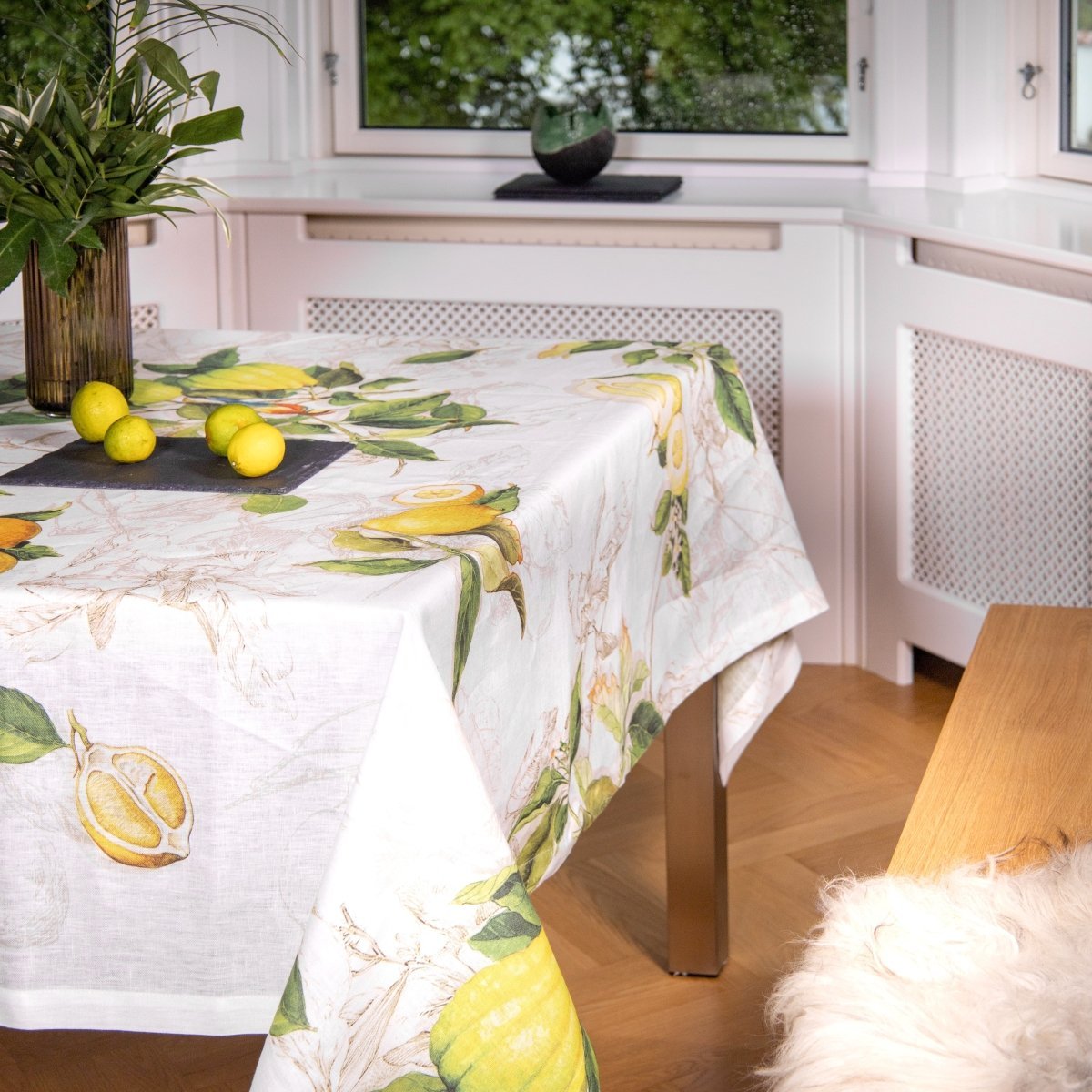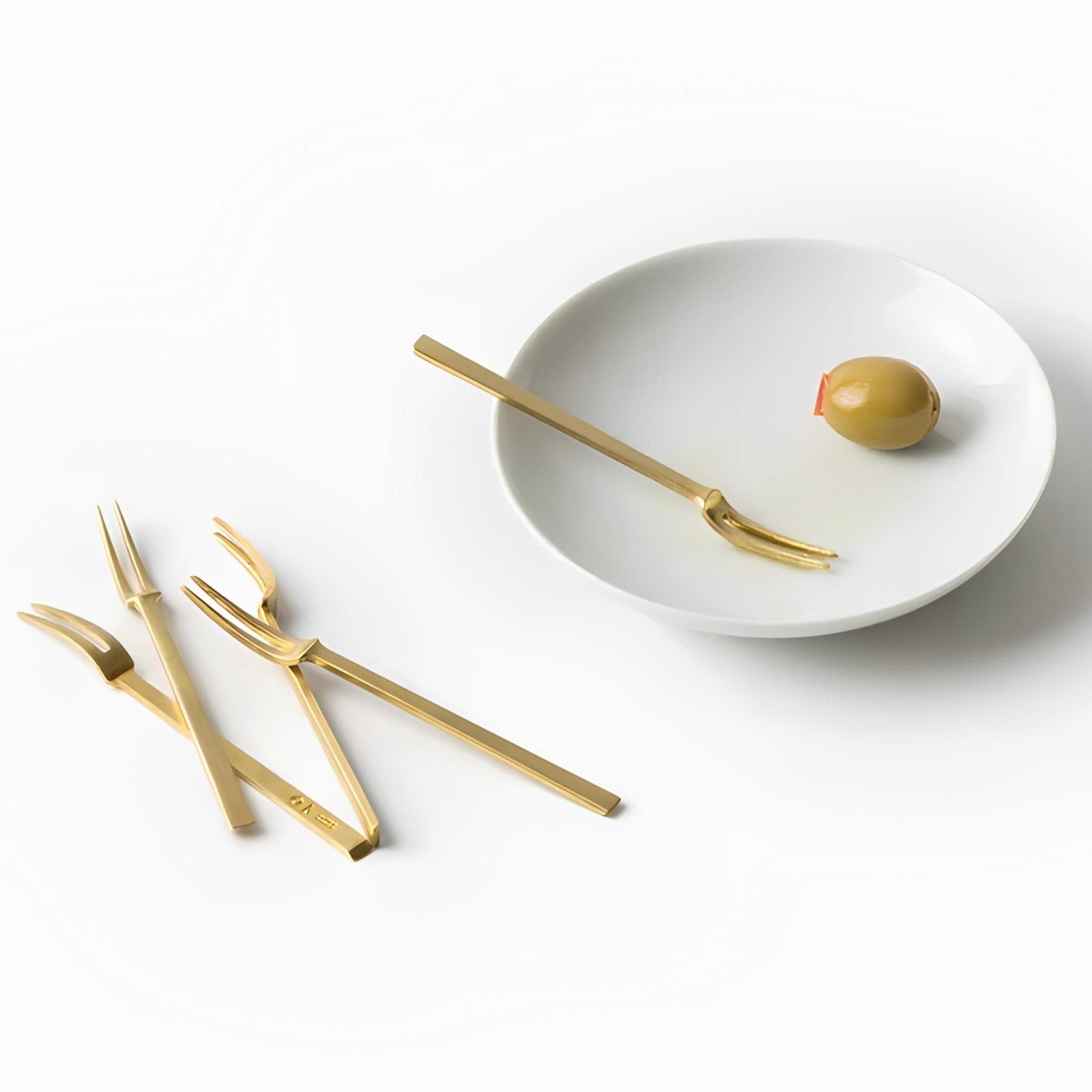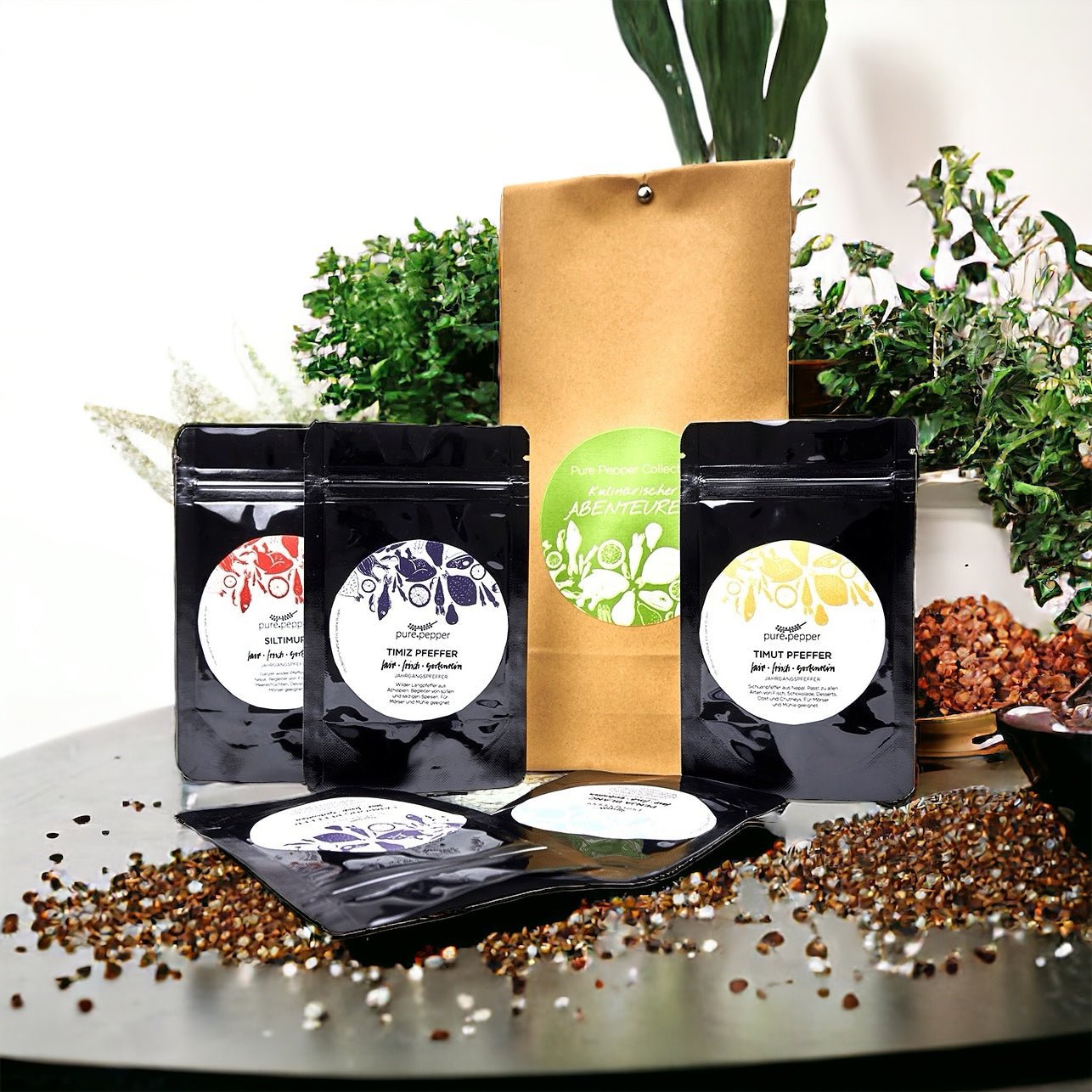
Pepper flavor pack - 'Culinary adventurer'
Including VAT. Shipping calculated at checkout
Stock item. Dispatched within 2-3 business days.
Getting to know new food cultures and foreign tastes is one of the most important things for a culinary adventurer.
In this flavor set you get two very different wild peppers from Nepal, a wild smoked pepper from Ethiopia, an irresistible white pepper and a long pepper that smells of cocoa.
You get:
10 g Lampong pepper
10 g Penja Blanc
10 g Timut pepper
10 g Timiz pepper
10 g Siltimur
The peppers in the "Culinary adventurer" flavor set go very well with seafood, chutneys and fruit dishes.
Kampot pepper:
This pepper, which is one of the best in the world, has been cultivated in the Cambodian province of Kampot for centuries.
This spicy black pepper grows in the southern part of Kampot province, which lies between the southern foothills of the Elephant Mountains and the Gulf of Thailand.
Due to this special location - between the mountains and the sea - the pepper plant grows in particularly nutrient-rich soil and can therefore develop its full aroma. The Kampot Noir harvest takes place in the months of April to June.
Muntok pepper:
Originates from the Indonesian island of Bangka, not far from Sumatra, and is named after its port of export. It contains only about 1% essential oils, has less aroma and a cleaner spiciness than traditional black pepper.
Penja pepper:
Penja Blanc grows on volcanic soil, which is rich in minerals and thus gives the pepper its character. The pepper has a round, intensely spicy taste. In addition, the peppers are fully ripe. The taste is robust and powerful with a mineral aroma. It harmonizes with fish and shellfish, poultry, vegetables, orange and pear.
Thekkady Pepper:
Originates from the southwestern Indian region of Kerala. In Periyar National Park, ancient varieties of pepper that are threatened with extinction are nurtured and hand-picked by local people as part of a sustainable, ecological management system. These old varieties have a much higher proportion of essential oils than new hybrid peppers.
Timut pepper:
This pepper from Nepal is considered the Nepalese Szechuan pepper, which is not botanically related to black pepper (Piper nigrum) but to citrus plants.
The Timut pepper plant grows wild as a tree with dense leafy branches, where thorns of up to two centimeters make harvesting difficult, around 2,000 meters. After flowering in spring, red berries are formed that contain shiny black seeds.
Later, in autumn, the ripe berries are harvested by hand. Then the pickers, almost always women, carefully separate the harvested berries from other plant components, such as stems and leaves, by hand. The berries are then dried and the small black seed balls fall out of the shell. That's a good thing, because they taste bitter.
Indian mountain pepper:
Indian mountain pepper is hand-picked "single-origin" and the pepper is dried in the sun for a very long time.
This jungle pepper grows in a pepper plantation in the heights of the Western Ghats in southern India. The plantation has been run as a pure organic farm for over 20 years and places great emphasis on rich biodiversity. This farm has one of the highest rainfall in India.
Sri Lanka pepper:
Sri Lanka is world famous for its excellent spices and spice gardens.
The pepper has very beautiful brown berries with a lot of strength and substance. And it has a nice spiciness that tingles a little and lingers in the mouth for a long time. The pepper from Sri Lanka therefore harmonizes very well with beef, soups and sauces, dressings and ragouts.
Real Products, Honest Pictures
At our core, we are all about the craft and the product itself. To give you the most authentic impression possible, we have chosen to take our own product photos.
Every image you see of our wood products is of a real item we have crafted for a customer. To ensure the best possible presentation, we may digitally adjust sharpness and colours or place the product in a relevant setting using artificial intelligence to better show it in a natural context.
A Guide to Variants
We are constantly expanding our product gallery. As many of our products come in a multitude of sizes and variations, we do not yet have photos of every single one. The image displayed when you make your selection primarily illustrates the chosen type of wood – not necessarily the specific size or design variation.
Every Piece of Wood is Unique
Wood is a living, natural material, and our passion is to create unique products with character. The grain and play of colours will therefore naturally vary from one product to the next. Please consider our photos as a source of inspiration and an indication of the high quality we deliver.
Any questions? We're happy to help.
Do you have questions about a design, size, type of wood, or do you have special requests? Please don't hesitate to contact us at info@rune-jakobsen.dk, and we will guide you to the right choice before you order.
Terms of Trade
Here you will find a comprehensive overview of all conditions when you shop at Rune-Jakobsen Design. We have tried to make it as clear and understandable as possible. If you have any questions, you are always welcome to contact us.
Prices, Discounts & Payment
Currency, VAT & Prices
All prices in the webshop are displayed in your local currency. Prices for customers in the EU and Norway always include the applicable local VAT. For more information about customs and duties, see the section below.
Fixed, fair prices: We believe in the value of good craftsmanship, which is why our prices are the same year-round. We do not participate in sales periods like Black Friday, but instead offer fixed benefits:
- Get 15% off when you purchase 3 or more wooden products.
- Get 10% off when you purchase 3 or more tea towels.
- Find great deals on discontinued items and prototypes in our Outlet .
- Sign up for our monthly newsletter to receive special offers only for subscribers.
💳 Payment
We offer secure payment with MasterCard, VISA, PayPal, Apple Pay, Google Pay, Shop Pay and MobilePay. All payment information is sent encrypted (SSL) so that only you and your card provider can read it.
When will the money be withdrawn?
- In-stock items: The amount is reserved on your account when ordering and is only deducted when we ship your package.
- Woodworks (custom wood products): As these products are handmade especially for you, the order is considered a binding order. The amount is therefore deducted when your order is approved and production has started. Should you regret your purchase before production has started, we will of course refund the full amount.
Delivery & Shipping
📦 Delivery times
As many of our products are handmade, delivery times vary. Here is an overview:
- Woodworks (Rune-Jakobsen wood products): The expected delivery time is stated on the individual product page. If you have any questions before ordering, please contact Kari on tel. (+45) 42 43 23 76.
- Ceramics & certain kitchen knives (Ansø of Denmark & M-knives): Expect a delivery time of approximately 2-3 weeks.
- In-stock items (shipped within 1-2 business days): Applies to spice grinders, jewelry, most textiles and Japanese chef's knives.
- Especially for Læsø Plaid: Expect a delivery time of approximately 5-7 business days.
🚚 Shipping Rates & Methods
We ship with GLS, DHL or UPS. The exact options and prices are calculated at checkout based on your location and the weight of the order. Here is an overview of starting prices:
- Denmark: 49 DKK to parcel shop / 69 DKK to private address. Free shipping on purchases over 2,500 DKK.
- Sweden: From 135 SEK. Free shipping on purchases over 2,500 SEK.
- Norway: From 159 NOK. Free shipping on purchases over 4,000 NOK.
- EU countries: From 9 EUR.
- United Kingdom (UK): From 14 GBP.
- Switzerland / Liechtenstein: From 19 CHF.
- United States: From 35 USD.
- Canada: From 49 CAD.
- Australia: From 85 AUD.
- New Zealand: From 110 NZD.
- Rest of the world: From 35 USD.
Customs, VAT & Taxes
We ship all items from Denmark (EU). Below you can see what this means for you.
🇪🇺 Orders within the EU
If you are purchasing from an EU country, the price you see at checkout is the final price. All prices include your local country's VAT and you will not be charged any additional fees upon delivery.
🇳🇴 Customers in Norway
If you are shopping from Norway, you can feel completely safe. The price you see at checkout is the final and total price. This is because we ship your package as 'Delivered Duty Paid' (DDP).
- We are VAT registered in Norway ( VOEC no. 2060051 ) and charge Norwegian VAT directly in the webshop.
- Any customs duties for your items will be calculated and included in the total price at checkout.
In other words, you will not be charged any additional costs or fees when importing to Norway.
🌎 Orders outside the EU (Rest of the World)
For countries outside the EU and Norway, orders are shipped as 'Delivered At Place' (DAP). This means that you as the customer are responsible for paying any local import costs (customs, VAT, fees) that are charged by the shipping company upon arrival. These fees are set by local authorities and are beyond our control.
🇬🇧 Customers in Great Britain (UK)
For purchases up to 135 GBP, there is no duty charge. For orders over this amount, you will be charged UK import duties. Read more from the UK authorities here .
🇺🇸 Customers in the USA
Orders placed via the Shop app (from Shopify) will automatically be charged applicable US sales tax. Orders placed directly in our webshop follow the general import rules as described above.
⏎ Returns & Complaints
30 Day Cancellation Policy
You have 30 days from receipt to notify us that you regret your purchase. After that, you have an additional 8 days to return the item. The right of withdrawal applies to all standard products.
Exception: For custom-made products, the right of withdrawal only applies if this has been agreed in writing in advance.
How to return
- Please notify us of your return at hello@rune-jakobsen.design .
- Pack the item securely in unused and undamaged condition.
- Send the package to the address below. You will be responsible for the return shipping costs, unless it is a complaint.
Return address:
Rune Jakobsen Design
Attn: Kari Rune-Jakobsen
Tiendemarken 14 A, Gudum
9280 Storvorde
Denmark
Danish customers: You can order a return label via Shipmondo here (only applies to cancellations).
Once we have received the returned item, we will refund the full purchase amount.
Complaint
You have a 2-year warranty on manufacturing and material defects according to the Danish Sales Act. The warranty does not cover defects or wear and tear resulting from improper use, violence or lack of maintenance.
If you wish to make a complaint about an item, please contact us as soon as possible and no later than 14 days after you have discovered the fault. If the complaint is approved, we will of course cover the return costs.
Legal & Contact
Disclaimer & Intellectual Property Rights
All products are sold "as is" and it is the customer's responsibility to use them safely and appropriately. Rune-Jakobsen Design cannot be held liable for damages resulting from misuse or incorrect use. All content on this website (text, images, design) belongs to Rune-Jakobsen Design and may not be copied without written permission.
Company information
Rune Jakobsen Design
by Torben & Kari Rune-Jakobsen
Tiendemarken 14 A, Gudum
9280 Storvorde, Denmark
CVR: DK27029167
Norwegian VOEC: 2060051
Contact us
If you have any questions, we are here to help.
Telephone: (+45) 42 43 43 93 / (+45) 42 43 23 76
Email: info@rune-jakobsen.dk
📦 Delivery
Delivery times
As many of our products are handmade to order, delivery times vary. Here is an overview so you know what to expect:
- Woodworks (Rune-Jakobsen wood products):
Due to high demand for the handmade products from Rune-Jakobsen woodworks, delivery time must be expected. The current delivery time is stated under each individual product on the product pages. If you have any questions before ordering, you are very welcome to contact Kari on tel. (+45) 42 43 23 76 or email info@rune-jakobsen.dk - Ceramics & certain kitchen knives (Ansø of Denmark and M-knives)
These products are also made to order. Expect a delivery time of approximately 2-3 weeks. - In stock items (1-2 day delivery):
Spice mills, jewelry from Scherning CPH, home textiles and Japanese chef's knives are in stock and shipped within 1-2 business days. - Læsø Plaid:
Expect a delivery time of approximately 5-7 business days.
🚚 Shipping & Prices
Shipping
We offer flexible delivery with GLS, DHL or UPS. The exact options and carriers depend on your location and will be presented to you at checkout.
Shipping prices
The price for delivery depends on your location and the weight of the shipment. Here is an overview of our starting prices. The final price is always calculated at checkout.
- Denmark: 49 DKK to parcel shop / 69 DKK to private address. Free shipping on purchases over 2,500 DKK.
- Sweden: From 135 SEK. Free shipping on purchases over 2,500 SEK.
- EU countries: From 9 EUR.
- Norway: From NOK 159. (See customs and VAT info below).
- United Kingdom (UK): From 12 GBP.
- Switzerland / Liechtenstein: From 19 CHF.
- United States: From 35 USD.
- Canada: From 49 CAD.
- Australia: From 85 AUD.
- New Zealand: From 89 NZD.
- Rest of the world: From 35 USD.
🛃 Customs, VAT & Taxes
We ship all items from our base in Denmark (EU). Below you can see what this means for you.
🇪🇺 Orders within the EU
If you are purchasing from an EU country, the price you see at checkout is the final price. All prices include your local country's VAT and you will not be charged any additional fees upon delivery.
🇳🇴 Customers in Norway
If you are shopping from Norway, you can feel completely safe. The price you see at checkout is the final and total price. This is because we ship your package as 'Delivered Duty Paid' (DDP).
- We are VAT registered in Norway ( VOEC no. 2060051 ) and charge Norwegian VAT directly in the webshop.
- Any customs duties for your items will be calculated and included in the total price at checkout.
In other words, you will not be charged any additional costs or fees when importing to Norway.
🌎 Orders outside the EU
For other countries outside the EU, orders are sent as 'Delivered At Place' (DAP).
This means for you as a customer:
- You are responsible for paying any import charges levied by the shipping company upon arrival in your country. This may include customs duties, import VAT and handling fees.
- These fees are set by the local authorities in your country and are beyond our control.
Worth knowing: Many countries have a de minimis threshold where orders under a certain value are exempt from customs duties. We recommend that you check the applicable rules for your country with your local customs authorities if you are in doubt.
By completing a purchase, you agree to these terms.
🇬🇧 Customers in Great Britain (UK)
For purchases up to 135 GBP, our goods are duty free. For orders over this amount, you will be charged UK import duties. Read more from the UK authorities here .
🇺🇸 Customers in the USA
Starting January 1, 2025, orders placed through the Shop app (from Shopify) will automatically be charged applicable US sales tax at checkout. This applies to all states that have sales tax. Orders placed directly in our webshop (including via Shop Pay) are exempt from this automatic calculation and follow the general import rules as described above.
ℹ️ General Information
Subject to change
Rune-Jakobsen Design reserves the right to continuously change and update prices, terms and conditions.
Contact
If you have any questions, we are here to help.
Phone: (+45) 42 43 43 93
Email: info@rune-jakobsen.dk
⏎ Right of withdrawal
You have 30 days after receipt to notify us that you regret the purchase, and then you have an additional 8 days to send it back.
The right of withdrawal applies to all standard products in the webshop.
The right of withdrawal and return for custom-made products in special sizes is only valid if a special (written) agreement has been made.
If you regret your purchase and return the item(s), we will refund the full purchase amount when the item(s) are delivered back to us in unused and undamaged condition.
⛓️💥 Complaints
According to the Danish Sales Act, Rune-Jakobsen Design grants a 2-year warranty from the invoice date for manufacturing and material defects (defects).
Complaints about defects or damage to delivered products must be made to Rune-Jakobsen Design within 14 days of receipt of the item(s).
The right of complaint does not cover errors, damage or wear and tear, directly or indirectly resulting from incorrect operation, incorrect maintenance, violence or unauthorized interventions.
If you cancel your purchase, you can use a shipping company of your choice and bear the costs associated with the return.
When returning due to a complaint, Rune-Jakobsen Design will cover the return costs.
Returns must be made to:
Rune Jakobsen Design
Attn: Kari Rune-Jakobsen
Tiendemarken 14 A, Gudum
9280 Storvorde
Denmark
🛃 Customs, VAT & Taxes
We ship all items from our base in Denmark (EU). Below you can see what this means for you.
🇪🇺 Orders within the EU
If you are purchasing from an EU country, the price you see at checkout is the final price. All prices include your local country's VAT and you will not be charged any additional fees upon delivery.
🇳🇴 Customers in Norway
If you are shopping from Norway, you can feel completely safe. The price you see at checkout is the final and total price. This is because we ship your package as 'Delivered Duty Paid' (DDP).
- We are VAT registered in Norway ( VOEC no. 2060051 ) and charge Norwegian VAT directly in the webshop.
- Any customs duties for your items will be calculated and included in the total price at checkout.
In other words, you will not be charged any additional costs or fees when importing to Norway.
🇨🇭 Customers in Switzerland
All orders are shipped as 'Delivered At Place' (DAP). This means that you as the customer are responsible for paying any local import costs (customs, VAT, fees) that are charged by the shipping company upon arrival.
These fees are set by the Swiss authorities and are beyond our control.
🌎 Orders outside the EU
For other countries outside the EU, orders are sent as 'Delivered At Place' (DAP).
This means for you as a customer:
- You are responsible for paying any import charges levied by the shipping company upon arrival in your country. This may include customs duties, import VAT and handling fees.
- These fees are set by the local authorities in your country and are beyond our control.
Worth knowing: Many countries have a de minimis threshold where orders under a certain value are exempt from customs duties. We recommend that you check the applicable rules for your country with your local customs authorities if you are in doubt.
By completing a purchase, you agree to these terms.
🇬🇧 Information for Our UK Customers.
We are pleased to inform you that the majority of our products are handcrafted in Denmark or elsewhere in the EU, and therefore qualify for duty-free import under the EU–UK Trade and Cooperation Agreement (TCA).
This means:
✅ No customs duties
Because our products are of EU origin, they are generally not subject to UK import duty. We provide all necessary documentation to ensure a smooth customs process.
VAT and Delivery
We are not registered for UK VAT and therefore do not charge VAT at checkout.
Instead, UK VAT (currently 20%) will be charged upon delivery, regardless of order value.
You will be contacted by the courier (typically DHL, UPS, or similar) and asked to pay VAT before the parcel is delivered.
Please note:
-
This applies to all orders, regardless of total amount.
-
There may also be a small handling fee charged by the courier for processing UK import VAT.
🇺🇸 Information for our US customers
Orders under $800 USD (value including shipping) are duty-free and tax-free for residential customers (Section 321 de minimis rule).
Orders placed via the Shop app (from Shopify) will automatically be charged applicable US sales tax. Orders placed directly in our webshop follow the general import rules as described above.
ℹ️ General Information
Subject to change
Rune-Jakobsen Design reserves the right to continuously change and update prices, terms and conditions.
Contact
If you have any questions, we are here to help.
Phone: (+45) 42 43 43 93
Email: info@rune-jakobsen.dk
Choose options



